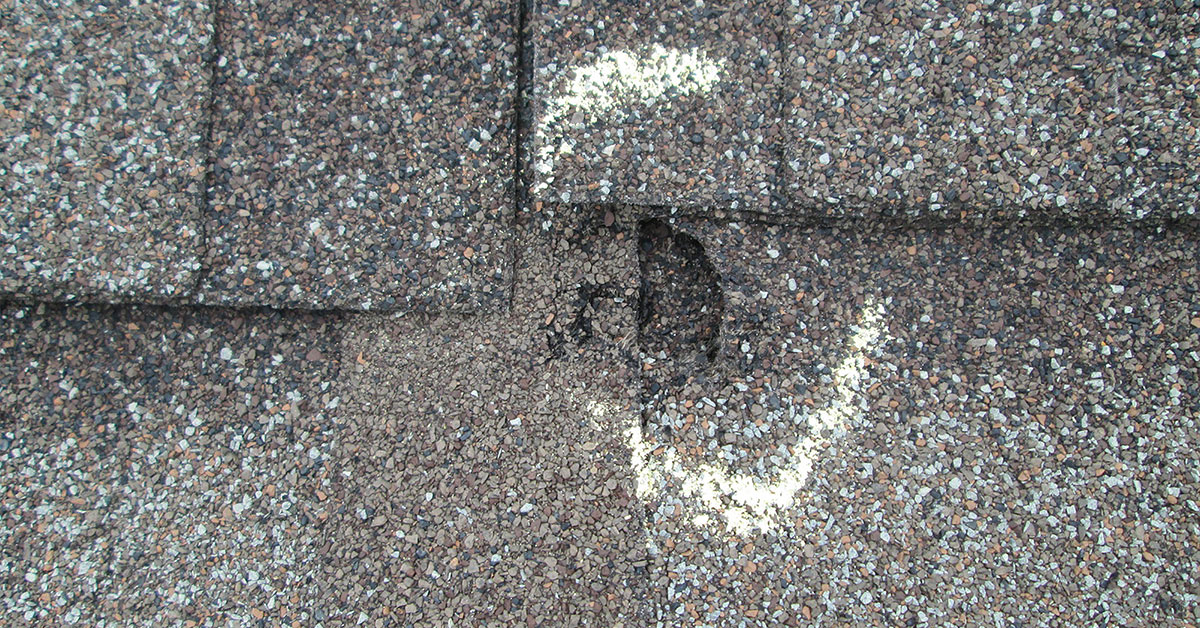San Antonio, Texas, and its surrounding areas can take a beating from a hailstorm from time to time, so it is understandable that many homeowners and business owners are concerned about potential roof damage. At Stephens Roofing & Remodeling, we understand the urgency of addressing hail damage to protect you and your home or business—because nobody wants a surprise indoor swimming pool!
According to risk management company, Verisk Analytics, Texas accounted for nearly a quarter of all properties affected by hailstorms in the United States in 2021. Furthermore, an estimated 93,766 properties were effected in Bexar county alone in the same year. Considering that around 17% of Texas properties will experience hail damage annually, it is especially important for us Texans to stay vigilant about assessing hail and storm damage at the first sign of trouble.
Identifying and addressing roof damage promptly is crucial to prevent further issues. Here’s what to look for if you suspect your roof has suffered from storm or hail damage.
Signs Your Roof Has Damage
VISIBLE DENTS AND BRUISES
Hailstones can leave noticeable dents or bruises on your roof. Check for any indentation on shingles, metal flashings, or other roof components. These marks are often accompanied by granule loss.
GRANULE LOSS
Inspect your gutters and downspouts for an accumulation of granules. Hail impacts can dislodge granules from asphalt shingles, which compromises the roof’s protective layer.
CRACKED OR BROKEN SHINGLES
High winds and hail can cause shingles to crack or break. Look for any shingles that are visibly damaged, curled, or torn.
MISSING SHINGLES
Strong winds during a storm can lift and remove shingles entirely. Check for any gaps where shingles should be, especially around the edges and ridges of your roof.
DAMAGED ROOF VENTS AND FLASHINGS
Roof vents, flashings, and other protrusions are vulnerable to hail damage. Inspect these areas for dents, cracks, or missing components.
LEAKS AND WATER STAINS
Inside your home, look for signs of leaks or water stains on ceilings and walls. This could indicate that hail or wind damage has compromised your roof’s integrity, allowing water to seep in.
DAMAGED GUTTERS AND DOWNSPOUTS
Hail can dent and damage gutters and downspouts. Check for any signs of impact or bending, which can affect the drainage system and lead to water buildup around your home.
CHECK ROOF VALLEYS AND EDGES
The valleys and edges of your roof are particularly vulnerable to storm damage. Look for any signs of damage in these areas, as they are crucial for directing water off your roof. Damaged valleys can lead to leaks and should be inspected thoroughly.
What to Do If You Suspect Roof Damage
Document the Damage:
Safely take clear photos of any visible damage to your roof and gutters. This documentation will be useful for insurance claims and for your roofing contractor to assess the extent of the damage.

Damaged Shingle Roof due to storm.
Contact a Professional Roofing Contractor:
Reach out to a certified roofing contractor to perform a detailed inspection of your roof. A professional can identify hidden damage and provide an accurate assessment of the repairs needed.
File an Insurance Claim:
If you have homeowner’s insurance, contact your insurance company to file a claim. Provide them with the documentation of the damage and any reports from your roofing contractor.
Avoid DIY Repairs:
While it might be tempting to try and fix roof damage yourself, it’s best to leave repairs to professionals. DIY repairs can be dangerous and may not address the underlying issues.
Looking for a trusted, local San Antonio roofing contractor to protect your home with expert roofing services?
At Stephens Roofing & Remodeling, we’re here to help you assess and repair storm damage quickly and efficiently. Contact us today for a free inspection and get your home back to its best condition.
Fill out a Free Estimate Form or call our office at 210-785-0994.




